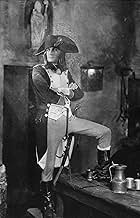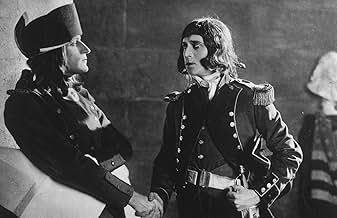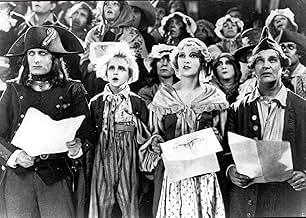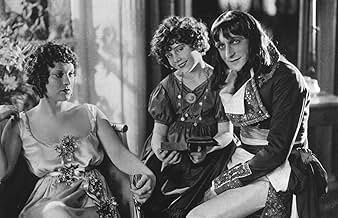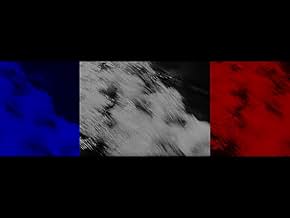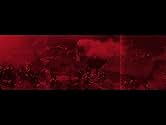Napoléon vu par Abel Gance
- 1927
- 5h 30min
CALIFICACIÓN DE IMDb
8.2/10
9.5 k
TU CALIFICACIÓN
Una película sobre la juventud del general francés y su carrera militar temprana.Una película sobre la juventud del general francés y su carrera militar temprana.Una película sobre la juventud del general francés y su carrera militar temprana.
- Premios
- 4 premios ganados en total
Nicolas Roudenko
- Napoléon Bonaparte enfant
- (as Vladimir Roudenko)
Max Maxudian
- Barras
- (as Maxudian)
- Dirección
- Guionista
- Todo el elenco y el equipo
- Producción, taquilla y más en IMDbPro
Opiniones destacadas
10fiddybop
The (more or less) full length version of Gance's NAPOLEON assembled by Kevin Brownlow over many years is an absolutely astounding achievement, both for Gance's inspired execution of a vision nearly too big for the screen, and Brownlow's dedication and perseverance, not to mention his superb reconstruction skills in bringing such a masterpiece back for the enjoyment of the world.
Well, not the whole world... Despite all this effort, the full restoration cannot be seen in the United States, on video or theatrically. It's a long story, but I just wanted potential and past viewers of this film to be aware of a few things:
-First of all, though video may be the only way to see this film in the U.S., keep in mind that home video can not even come close to providing the proper setting for such a gorgeous and epic film. The word "epic" has in fact never been so appropriate. So while I don't discourage people from seeing the video for lack of theatrical viewing opportunities, remember that the film was made on and meant to be seen on a grand scale.
-Secondly, the version currently available in the U.S. is not shown at the correct speed (24fps instead of the necessary 18/20fps). Also, it is missing footage. It is my understanding that in order to provide wider release possibilities in the U.S. upon the completion of the first major restoration in the '70s, the U.S. prints were edited somewhat to cut down on the admittedly long running time. This is also why the film is shown faster in the U.S., at "sound speed" or 24 frames per second. The newest restoration runs at 333 minutes, while the U.S. version is only 235.
The primary reason why the latest, glorious 2000 restoration of the film cannot be seen in the U.S. lies mainly with Francis Ford Coppola. Coppola controls the U.S. distribution rights, and allows only the U.S. version - with a score written by his father - to be shown. This is unlikely to change in the near future, so until then, deal with the substandard videotapes or plan your next European trip around one of the periodic English screenings of the film version - believe me, it's worth it!!
Well, not the whole world... Despite all this effort, the full restoration cannot be seen in the United States, on video or theatrically. It's a long story, but I just wanted potential and past viewers of this film to be aware of a few things:
-First of all, though video may be the only way to see this film in the U.S., keep in mind that home video can not even come close to providing the proper setting for such a gorgeous and epic film. The word "epic" has in fact never been so appropriate. So while I don't discourage people from seeing the video for lack of theatrical viewing opportunities, remember that the film was made on and meant to be seen on a grand scale.
-Secondly, the version currently available in the U.S. is not shown at the correct speed (24fps instead of the necessary 18/20fps). Also, it is missing footage. It is my understanding that in order to provide wider release possibilities in the U.S. upon the completion of the first major restoration in the '70s, the U.S. prints were edited somewhat to cut down on the admittedly long running time. This is also why the film is shown faster in the U.S., at "sound speed" or 24 frames per second. The newest restoration runs at 333 minutes, while the U.S. version is only 235.
The primary reason why the latest, glorious 2000 restoration of the film cannot be seen in the U.S. lies mainly with Francis Ford Coppola. Coppola controls the U.S. distribution rights, and allows only the U.S. version - with a score written by his father - to be shown. This is unlikely to change in the near future, so until then, deal with the substandard videotapes or plan your next European trip around one of the periodic English screenings of the film version - believe me, it's worth it!!
Modern film-goers are used to explication, to having everything explained for them. The art of visual story-telling -- where images and action indicate the emotional state of characters, rather than have the actor tell you how angry or sad or excited they are -- has almost been lost. But "Napoleon" is a masterpiece of visual art. (Writer-director Abel Gance was honored at the Telluride film festival a few years ago for this film. Far too late, in my opinion.)
The film tells the life of Napoleon Bonaparte -- the Corsican who adopts France as his homeland, rises to supreme general of the French armies during the Revolution and eventually seizes the seat of government itself (twice!). It starts out with a lengthy (if perhaps mythological) examination of Napoleon's childhood in a Catholic school. Snowball fights between Napoleon and two future foes portend the future. Napoleon's friendship with a pet eagle foreshadows his role as emperor of France. But even though these scenes represent more artistic license than history, they are tremendously well-acted by the young Vladimir Roudenko (as young Napoleon). Among the many innovations are some relatively naturalistic acting by the members of the cast and some jaw-dropping editing and montage sequences (especially during the brawl during the snowball fight and the fight in the sleeping quarters). Such innovative use of editing probably wouldn't be seen for another 30 or 40 years!
After almost an hour of this three-hour epic, we're transported to the period of the adult Napoleon -- acted with gravitas and iciness by Albert Dieudonne (who is among the cast's taller actors, just as Napoleon was in reality fairly tall, too). The film dwells extensively on the formative period when Napoleon first arrives in Paris during the late Revolution, focusing heavily on how the chaos in the city stamped into Napoleon the authoritarianism and dictatorial leadership traits that would emerge later in life. This is perhaps the highlight of the film. The editing and visual images create a swirling, spinning, mind-blowing effect that is extremely effective.
The film then focuses on Napoleon's return to Corisca -- whose people held allegiances to Spain and Italy as well as France, and where Napoleon faced imprisonment due to his French leanings. For anyone interested in learning more about the life of Napoleon, this segment is pretty eye-opening. It's followed by a sequence at sea that's amazingly effective in conveying the power and terror of a storm at sea. For its time, this film contained some powerful ocean footage (watch for those amazing low-angle shots, and the ingenious intercutting of the "angry storm" of the French assembly and Napoleon's tiny skiff tossed about on the stormy seas).
The final hour and a half of the film depicts Napoleon's rise in the army and his tenure as emperor of France. This is perhaps the portion of the film that most viewers would think of as "the story of Napoleon." But perhaps one of the reasons why this film is so fascinating is that it delves deeply into the formative episodes in Napoleon's early life and gives as much importance to them as to his later actions on the battlefield in Italy, his tenure as emperor, and his subsequent exile, return, and exile. And the film does so without being heavy-handed, un-subtle or overly expositive.
A restored version of "Napoleon" is making the rounds in the US in cinemas and on television. It contains a new musical soundtrack by Carmine Coppola, which is fairly good (although at times repetitive and too loud). The film was restored and re-edited by Francis Ford Coppola's Zoetrope studio. Zoetrope added some tinting (the ocean scenes are all blue, the "angry mob" scenes are all red) that is interesting but perhaps not quite the "restoration" some viewers might have had in mind.
Watch "Napoleon." You'll be very surprised at how modern the film is. Compared to other silent films of the 1920s, with the undercranked action, overly emotive acting, fantastic plots and theatrical make-up and costumes, "Napoleon" is years ahead of its time. Silent films require concentration to watch. "Napoleon" will keep your interest.
The film tells the life of Napoleon Bonaparte -- the Corsican who adopts France as his homeland, rises to supreme general of the French armies during the Revolution and eventually seizes the seat of government itself (twice!). It starts out with a lengthy (if perhaps mythological) examination of Napoleon's childhood in a Catholic school. Snowball fights between Napoleon and two future foes portend the future. Napoleon's friendship with a pet eagle foreshadows his role as emperor of France. But even though these scenes represent more artistic license than history, they are tremendously well-acted by the young Vladimir Roudenko (as young Napoleon). Among the many innovations are some relatively naturalistic acting by the members of the cast and some jaw-dropping editing and montage sequences (especially during the brawl during the snowball fight and the fight in the sleeping quarters). Such innovative use of editing probably wouldn't be seen for another 30 or 40 years!
After almost an hour of this three-hour epic, we're transported to the period of the adult Napoleon -- acted with gravitas and iciness by Albert Dieudonne (who is among the cast's taller actors, just as Napoleon was in reality fairly tall, too). The film dwells extensively on the formative period when Napoleon first arrives in Paris during the late Revolution, focusing heavily on how the chaos in the city stamped into Napoleon the authoritarianism and dictatorial leadership traits that would emerge later in life. This is perhaps the highlight of the film. The editing and visual images create a swirling, spinning, mind-blowing effect that is extremely effective.
The film then focuses on Napoleon's return to Corisca -- whose people held allegiances to Spain and Italy as well as France, and where Napoleon faced imprisonment due to his French leanings. For anyone interested in learning more about the life of Napoleon, this segment is pretty eye-opening. It's followed by a sequence at sea that's amazingly effective in conveying the power and terror of a storm at sea. For its time, this film contained some powerful ocean footage (watch for those amazing low-angle shots, and the ingenious intercutting of the "angry storm" of the French assembly and Napoleon's tiny skiff tossed about on the stormy seas).
The final hour and a half of the film depicts Napoleon's rise in the army and his tenure as emperor of France. This is perhaps the portion of the film that most viewers would think of as "the story of Napoleon." But perhaps one of the reasons why this film is so fascinating is that it delves deeply into the formative episodes in Napoleon's early life and gives as much importance to them as to his later actions on the battlefield in Italy, his tenure as emperor, and his subsequent exile, return, and exile. And the film does so without being heavy-handed, un-subtle or overly expositive.
A restored version of "Napoleon" is making the rounds in the US in cinemas and on television. It contains a new musical soundtrack by Carmine Coppola, which is fairly good (although at times repetitive and too loud). The film was restored and re-edited by Francis Ford Coppola's Zoetrope studio. Zoetrope added some tinting (the ocean scenes are all blue, the "angry mob" scenes are all red) that is interesting but perhaps not quite the "restoration" some viewers might have had in mind.
Watch "Napoleon." You'll be very surprised at how modern the film is. Compared to other silent films of the 1920s, with the undercranked action, overly emotive acting, fantastic plots and theatrical make-up and costumes, "Napoleon" is years ahead of its time. Silent films require concentration to watch. "Napoleon" will keep your interest.
10Quibble
I was lucky enough to see the very latest restoration of Napoleon by silent film expert Kevin Brownlow at the Royal Festival Hall in London earlier this month (December 2004). Carl Davis was there in person to conduct the London Philharmonic Orchestra in a live performance of his own brilliant score. It was the most moving and overwhelming cinematic experience of my life and I doubt whether it can ever be bettered. The film is decades ahead of its time, the bravura editing and inspired direction reveal Gance as the true genius that he was.
However...
The very performance I attended was under legal threats from Coppola, who wished to ban its screening. Back in 1980-81, he and his Zoetrope Studio helped fund a restoration and he got his father to compose a score. He helped get the US audiences to recognise what a remarkable work of genius Napoleon really is, and all credit to him for trying to do so. This would all seem very well and good, but even in 1981 Coppola wasn't showing the best version of the restored film that he could have. He had cut it down from Brownlow's (then) latest version to fit the score his father had written. He also showed it at 24 fps instead of the intended (and more realistic - the movements are at a normal rate, not unnaturally sped-up) 20 fps. Throughout the 1980s, Brownlow and others in Europe kept finding better elements and more footage. Yet, Coppola's version was still being called "THE restoration" and not altered at all. Brownlow also found prints with more authentic editing, giving a much better idea of the order and number of cuts in many sequences (so many versions/reels of Napoleon have had inferior takes/editing put in by people other than Gance that it took time to discover the best and most authentic). It was becoming increasingly clear that Coppola's version was very much flawed and out-of-date with the new discoveries. In 2000, the latest and most complete version available (including the authentic tints, near-definitive editing in line with Gance's intentions, and the best print so far etc.) was screened in London. Carl Davis had altered and lengthened his magnificent score to match the latest version. Even after this showing in 2000, elements were still being improved to make the film as close as possible to Gance's intentions. The 2004 screening which I attended had a print that ran for nearly 5 and a half hours. Coppola's version runs for less than 4 hours and it hasn't been touched to include any improvements in print quality or more authentic tinting or editing.
The Coppola version of Napoleon, with a run time of 223 minutes (3 hours and 43 minutes) is out on DVD in Australia. I do not know when or even if it will come out on DVD in the US. Rest assured, it will NOT be the best version of this great film, or anything close to it. Coppola and Zoetrope sold rights to their version of the film to Universal in the 1980s and so now the issue of rights has become entangled with a major studio (Universal Studios, incidentally, destroyed all their silent film negatives in 1947 - a very (in)appropriate choice of distributor for a film whose failure and subsequent neglect was mainly due to a horrendous re-editing by studios (MGM) in 1927).
The Australian DVD, released by Universal, is filled with faults. Apart from inferior image quality (unlike the 2004 print, which was superb and scarcely a speck of dirt was visible any time during the whole 5 and a half hours), the final triptych sequence is horrendously cropped from 3.99:1 to 2.55:1 and isn't even adjusted for widescreen televisions. It's also exactly the same version from 1981 which, even back then, wasn't the best there was available. The music, admirable though it is, cannot compare to Davis' score (he has worked on many other silent film scores with great acclaim) - especially now that Davis has reworked the score for the latest version.
Coppola's efforts to suppress the latest restoration are a dreadful example of precisely the kind of money-driven censorship and selfishness that Napoleon has been dogged by for eighty years. Not just the 90+ minutes of extra footage, but the score and print quality itself, makes the latest print by the BFI/BFA/Brownlow indispensable. Anyone who claims to have rescued this film (as Coppola did in 1981, even though Brownlow had been working for decades before then, alongside Gance himself, to remaster the film) and yet tries to ban a closer version to the original film is monstrously hypocritical. As much as I welcome any hope of seeing Napoleon on DVD, I recoil at the thought of thousands of people being forced to watch a terribly flawed and inferior version of this masterpiece. Even as I type, there are rumours of even more lost footage from Napoleon being found in Denmark - with any luck this will lead to an even better restoration than the 2004 one.
This ongoing saga of restoration (and much credit is due to the person who seems to have the least legal rights out of the whole cast of those involved in the restored film: Kevin Brownlow) means that a DVD release of the Coppola version, with its many flaws, seems absurd and remarkably selfish and damaging. This film desperately needs to be released on DVD, but only in as close a form as possible to Gance's original masterpiece of 1927, seen by far too few people. That US rights-holders are trying to ban better versions with over 90 minutes extra in them is just another sad chapter in the story of this much-abused wonder of cinema. This is a magnificent film and deserves better than the shoddy and selfish treatment it has been given in America.
However...
The very performance I attended was under legal threats from Coppola, who wished to ban its screening. Back in 1980-81, he and his Zoetrope Studio helped fund a restoration and he got his father to compose a score. He helped get the US audiences to recognise what a remarkable work of genius Napoleon really is, and all credit to him for trying to do so. This would all seem very well and good, but even in 1981 Coppola wasn't showing the best version of the restored film that he could have. He had cut it down from Brownlow's (then) latest version to fit the score his father had written. He also showed it at 24 fps instead of the intended (and more realistic - the movements are at a normal rate, not unnaturally sped-up) 20 fps. Throughout the 1980s, Brownlow and others in Europe kept finding better elements and more footage. Yet, Coppola's version was still being called "THE restoration" and not altered at all. Brownlow also found prints with more authentic editing, giving a much better idea of the order and number of cuts in many sequences (so many versions/reels of Napoleon have had inferior takes/editing put in by people other than Gance that it took time to discover the best and most authentic). It was becoming increasingly clear that Coppola's version was very much flawed and out-of-date with the new discoveries. In 2000, the latest and most complete version available (including the authentic tints, near-definitive editing in line with Gance's intentions, and the best print so far etc.) was screened in London. Carl Davis had altered and lengthened his magnificent score to match the latest version. Even after this showing in 2000, elements were still being improved to make the film as close as possible to Gance's intentions. The 2004 screening which I attended had a print that ran for nearly 5 and a half hours. Coppola's version runs for less than 4 hours and it hasn't been touched to include any improvements in print quality or more authentic tinting or editing.
The Coppola version of Napoleon, with a run time of 223 minutes (3 hours and 43 minutes) is out on DVD in Australia. I do not know when or even if it will come out on DVD in the US. Rest assured, it will NOT be the best version of this great film, or anything close to it. Coppola and Zoetrope sold rights to their version of the film to Universal in the 1980s and so now the issue of rights has become entangled with a major studio (Universal Studios, incidentally, destroyed all their silent film negatives in 1947 - a very (in)appropriate choice of distributor for a film whose failure and subsequent neglect was mainly due to a horrendous re-editing by studios (MGM) in 1927).
The Australian DVD, released by Universal, is filled with faults. Apart from inferior image quality (unlike the 2004 print, which was superb and scarcely a speck of dirt was visible any time during the whole 5 and a half hours), the final triptych sequence is horrendously cropped from 3.99:1 to 2.55:1 and isn't even adjusted for widescreen televisions. It's also exactly the same version from 1981 which, even back then, wasn't the best there was available. The music, admirable though it is, cannot compare to Davis' score (he has worked on many other silent film scores with great acclaim) - especially now that Davis has reworked the score for the latest version.
Coppola's efforts to suppress the latest restoration are a dreadful example of precisely the kind of money-driven censorship and selfishness that Napoleon has been dogged by for eighty years. Not just the 90+ minutes of extra footage, but the score and print quality itself, makes the latest print by the BFI/BFA/Brownlow indispensable. Anyone who claims to have rescued this film (as Coppola did in 1981, even though Brownlow had been working for decades before then, alongside Gance himself, to remaster the film) and yet tries to ban a closer version to the original film is monstrously hypocritical. As much as I welcome any hope of seeing Napoleon on DVD, I recoil at the thought of thousands of people being forced to watch a terribly flawed and inferior version of this masterpiece. Even as I type, there are rumours of even more lost footage from Napoleon being found in Denmark - with any luck this will lead to an even better restoration than the 2004 one.
This ongoing saga of restoration (and much credit is due to the person who seems to have the least legal rights out of the whole cast of those involved in the restored film: Kevin Brownlow) means that a DVD release of the Coppola version, with its many flaws, seems absurd and remarkably selfish and damaging. This film desperately needs to be released on DVD, but only in as close a form as possible to Gance's original masterpiece of 1927, seen by far too few people. That US rights-holders are trying to ban better versions with over 90 minutes extra in them is just another sad chapter in the story of this much-abused wonder of cinema. This is a magnificent film and deserves better than the shoddy and selfish treatment it has been given in America.
Abel Gance's 'Napoleon' was premiered on April 7, 1927, at the Paris Opera House, the first movie to be accorded such an honor
It was been shown on a triple screen and to full orchestral accompaniment, running slightly under four hours
Impressive as it seems, it was conceived as the first of a six-part biography running many hours and tracing the life of Napoleon from childhood to the bitter end in St Helena Fortunately-for Abel Gance who directed and for us-the project was only completed to that moment where Napoleon enters Italy at the head of the French army, and the later and less pleasant aspects of his spectacular career were left unfilmed... The Little Corporal, after all, is a less controversial figure than the Emperor
Gance needed a figure as emblematic and powerful as 'Napoleon' to fulfill his dream of super cinema
'Napoleon' is a masterpiece of excess:
'Napoleon' is like one grand musical composition. It throbs with life
That was Gance the great filmmaker who thought that film could do everything and who said to Kevin Brownlow: 'For me, the cinema is not just pictures. It is something great, mysterious and sublime.' Brownlow is known now not only as an English filmmaker and film historian but also as a great restorer of silent films, notably Abel Gance's 'Napoleon.'
Impressive as it seems, it was conceived as the first of a six-part biography running many hours and tracing the life of Napoleon from childhood to the bitter end in St Helena Fortunately-for Abel Gance who directed and for us-the project was only completed to that moment where Napoleon enters Italy at the head of the French army, and the later and less pleasant aspects of his spectacular career were left unfilmed... The Little Corporal, after all, is a less controversial figure than the Emperor
Gance needed a figure as emblematic and powerful as 'Napoleon' to fulfill his dream of super cinema
'Napoleon' is a masterpiece of excess:
- The child Bonaparte keeps a pet eagle and wins a snow fight while at school in Brienne... In this sequence, the frame splits into nine subliminal images; as Napoleon watches his men entering Italy, the screen expands on each side to form a breathtaking panorama, then changes into three coordinated views of the scene
- The National Convention seems to sway and rock as Napoleon makes his escape from Corsica in a storm-tossed sailboat
- The Gallic of cabaret singers, Damia, leads French troops into battle personifying 'La Marseillaise'
'Napoleon' is like one grand musical composition. It throbs with life
That was Gance the great filmmaker who thought that film could do everything and who said to Kevin Brownlow: 'For me, the cinema is not just pictures. It is something great, mysterious and sublime.' Brownlow is known now not only as an English filmmaker and film historian but also as a great restorer of silent films, notably Abel Gance's 'Napoleon.'
I had the privilege of seeing the restored version of this film, to the accompaniment of a live orchestra under the baton of Carmine Coppola, in Los Angeles' un-air-conditioned war memorial. Despite uncomfortable seating and terrible heat, the experience of this four hour movie remains a watershed for anyone who attended. To think that because of the invention of sound, this masterpiece was partially destroyed by Abel Gance in a fit of depression, is heartbreaking. More shocking is that Gance's invention of Cinemascope - of which today only the end of the film retains in its triptych screen effect - was lost to filmgoers until its reinvention years later.
Obviously true art can't be hidden forever, and Gance did live to see Napoleon take its rightful place in cinematic history. Though it is many years later, I can still remember the tears and the ovation when the black screen with the white signature, "Abel Gance", signified the end of the film. A compelling and great work of art.
Obviously true art can't be hidden forever, and Gance did live to see Napoleon take its rightful place in cinematic history. Though it is many years later, I can still remember the tears and the ovation when the black screen with the white signature, "Abel Gance", signified the end of the film. A compelling and great work of art.
¿Sabías que…?
- TriviaAbel Gance remembered one scene that was removed by the censors--that of the execution of civilians by soldiers. The camera is used like a bullet, zooming towards one human target, then another, then another. The sequence is lost, although a still photograph does survive.
- ErroresOne of the Corsicans in the inn states "Our fatherland is Italy with the Duke of Savoy". The Duchy of Savoy had ceased to exist in 1713 (eighty years earlier), when the Duchy acquired the Kingdom of Sardinia and the Duke then bore the title of the King of Sardinia. Italy was a geographic place not a political entity at this time.
- Versiones alternativasThere are apparently at least 19 different versions of this film, starting with the original 6-hours cut (in a "triptych" format, requiring three projectors on three screens, called Polyvision). It has been shown in various formats and different running times, including a 1934 version re-edited by director Abel Gance and featuring an added soundtrack.
- ConexionesEdited into Napoléon Bonaparte (1935)
- Bandas sonorasThe Thrill of Being In Love (Love Theme of Napoleon and Josephine)
Music by Carmine Coppola
Lyrics by Italia Coppola (USA version)
UK version: score by Carl Davis (based largely on works by Beethoven)
Selecciones populares
Inicia sesión para calificar y agrega a la lista de videos para obtener recomendaciones personalizadas
- How long is Napoleon?Con tecnología de Alexa
Detalles
Taquilla
- Presupuesto
- FRF 20,000,000 (estimado)
- Total a nivel mundial
- USD 39,448
- Tiempo de ejecución5 horas 30 minutos
- Color
- Mezcla de sonido
- Relación de aspecto
- 1.33 : 1
Contribuir a esta página
Sugiere una edición o agrega el contenido que falta


